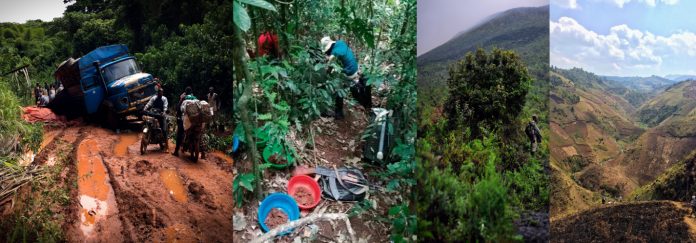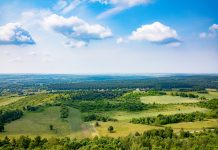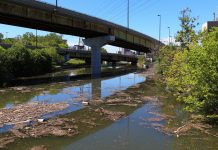The role of the changing Tropics for future global carbon dynamics
Tropical forests are hotspots of modern-day land-use change and are, at the same time, among the largest terrestrial carbon reservoirs. In particular, the African continent will be facing huge environmental and societal challenges with a projected population growth of 400% by the end of this century (Gerland et al. 2014). The Democratic Republic of the Congo, for example, is projected to experience an additional five-fold growth in human population from currently 80 million to 400 million in 2100 before population size will stabilise. The resulting pressure on land resources is further aggravated by national programmes encouraging deforestation to alleviate poverty and stimulate economic growth.
As a consequence, land conversion to intensive agriculture is increasing and soil degradation is a growing threat to food security (Gerland et al. 2014). In combination with a strong direct dependency on natural resources to meet nutritional and energy demands, African primary rainforests are becoming increasingly fragmented and degraded. Increasing rates of deforestation and forest regrowth (Hansen et al. 2013) lead to a loss in biodiversity and endanger the last refuges of larger mammal populations in Africa.
The tropical knowledge gap related to nutrient and carbon cycling
Despite their importance, tropical soils and ecosystems are among the least studied in the world. Most of our process understanding of biogeochemical cycles between plants and soils and how these cycles are implemented in global models is derived from temperate regions in developed countries. However, temperate ecosystems differ fundamentally in the way nutrients cycle and the dominating and limiting factors for plant growth. For example, in contrast to soils in the temperate zone, long-lasting chemical weathering has led to the depletion of mineral nutrients from soils in tropical systems. Although the remaining available nutrients are very efficiently re-cycled in tropical biospheres, losing a thin, fertile layer of topsoil leaves reduces the carrying capacity of most tropical soils drastically. Once erosion removes the nutrient containing litter and topsoil layers, fields often have to be abandoned and only partially recover, which is one of the reasons for shifting cultivation in the tropics. Given the rapid population growth in Africa in some of the least developed and stable countries of the globe, this traditional form of agriculture is no longer possible without permanently damaging and altering tropical ecosystems.
Our lack of knowledge on the consequences of land-use change on plant-soil interactions also limits our ability to predict future trajectories of tropical ecosystems to mitigate climate change. For example, there are now more secondary forests than ever (FAO 2010) which take up an estimated 1.7 billion tonnes of carbon (C) per year, exceeding the carbon uptake in primary, intact tropical forests (1 billion ton of C per year; (Pan et al. 2011). As a result of these changes, tropical forests will play a key role in moderating the impact of anthropogenic greenhouse gas (GHG) emissions (Beer et al. 2010). At the same time, forest degradation leads to losses of C in soils through erosion which have been largely neglected in assessments of C fluxes from tropical ecosystems. Given the sheer quantity and production of organic C in tropical ecosystems, its mobilisation and transport via fluvial systems represent a major component of the global C cycle. Isotopic analyses of C mobilised to streams from deforested catchments in the Congo suggests that anthropogenic land-use change destabilises previously sequestered stores of organic C in tropical soils and that rivers are important loss pathways for this once-stable C (Drake et al 2019). The fate of this mobilised carbon is unknown and adds to the uncertainty surrounding the role of African tropical forests for global C cycling: Although the tropics are home to the largest fluxes of carbon and water globally, a lack of data and process-level understanding limits our ability to model global biogeochemical cycles.
Therefore, large scale initiatives are focusing more and more on in-depth monitoring and modelling of future GHG sinks of tropical forests. The African tropical rainforest is now in the spotlight of several international initiatives to counteract deforestation and increase C storage (i.e. United Nations Reducing Emissions from Deforestation and Forest Degradation Programme UN-REDD and REDD+). However, established observatories in the Congo Basin focus on questions related to biodiversity preservation and C storage in the biosphere, largely ignoring soils. Furthermore, in situ observation networks, such as FLUXNET and ground-based forest inventory plots are spatially biased towards more easily accessible regions bordering the heart of the wet tropics and, therefore, undersample C stocks and fluxes (Schimel et al. 2015).
Why soils are key to the future of tropical ecosystems and societal stability
Soils are the foundation of the food system. Soil quality and resilience are, therefore, key to avoiding future humanitarian crisis and the resulting mass migration. Finding solutions for Africa’s future challenges requires economic and environmental solutions, as well as committed politicians and stakeholders that understand the gravity and urgency of the situation. Sustaining and managing fragile tropical ecosystems cannot rely on the same solutions that work in the Northern hemisphere. A better understanding of the interactions between soil fertility status, land-use conversion and soil erosion is urgently needed in the context of the sustainable development of agriculture. In parallel, diverse and widespread forests developed on healthy soils with low pressure from humans will be needed to maintain the services that tropical ecosystems provide for global climate and to preserve a unique and diverse biosphere.
Environmental research within the Congo Biogeochemistry Observatory
Studying the rapid environmental changes to the African Tropics is a central research objective for the scientists of the Congo Biogeochemistry Observatory (CBO). CBO is a consortium of researchers who study biogeochemical cycles and atmosphere-plant-soil interactions in tropical Africa with a focus on the Congo Basin and the African Great Lakes region. Within CBO’s framework, a multinational group of young scientists from Africa, Europe and the United States conducts cross-disciplinary environmental research in one of the least studied regions of the globe. CBO scientists argue that in order to understand tropical soil C cycling, it is necessary to consider the effects of climate, geology, soil formation, microbial biochemistry, vegetation and human disturbance. In their work, environmental researchers are trying to understand landscapes as a whole and how humans re-shape and affect tropical ecosystems. The dedication of young African researchers to understand and preserve the threatened natural resources of their home countries are paired with the resources of some of the most experienced and largest research groups focusing on African tropical forests and agroecosystems. Research at CBO is funded and supported by German, Belgian, U.S. and Swiss Research foundations and linked to world-class research institutes at Ghent University, ETH Zurich, the University of Louvain and the Max Planck Society.
References
Beer et al. 2010. Terrestrial Gross Carbon Dioxide Uptake: Global Distribution and Covariation with Climate. Science 329, 834-838. DOI:10.1126/science.1184984.
Drake et al. 2019. Mobilization of aged and biolabile soil carbon by tropical deforestation. Nature Geoscience 12, 541-546. DOI:10.1038/s41561-019-0384-9.
Gerland et al. 2014. World population stabilization unlikely this century. Science 346, 234-237. DOI:10.1126/science.1257469.
Hansen et al. 2013. High-Resolution Global Maps of 21st-CenturyForest Cover Change. Science 342, 850-853. DOI:10.1126/science.1244693.
*Please note: this is a commercial profile.











